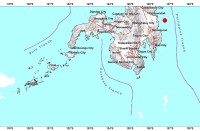
(Reuters) — Two-fingered ‘peace’ signs – or V-signs – taken by high-resolution digital cameras from as far away as three metres (9 feet) may lead to fingerprint theft, Japanese researchers warn.
Millions of photographs are uploaded onto social networking sites daily, many of which involve people making the ubiquitous sign.
Isao Echizen, a professor at Japan’s National Institute of Informatics (NIII), says advanced technology is not necessary for fraudsters to copy fingerprints.
“If a fingerprint is stolen, if they’re able to copy that fingerprint, fake ones can be produced. One can use it to assume another’s identity, such as accessing a smartphone or breaking and entering into a restricted area such as an apartment,” Echizen added.
Echizen and fellow researcher Tateo Ogane, reproduced on camera an experiment for Reuters in which they were able to extract Echizen’s fingerprints from a digital photograph taken about three metres away.
The experiment, which Echizen says has a better success rate on a sunny day, involved Echizen being photographed as he stood still at a well-lit area outdoors while making a V-sign with both hands. Echizen’s right hand was bare, while the tops of the fingers of his left another were covered with a prototype product that NIII researchers have designed as a fingerprint theft prevention. This consists of transparent film stickers designed as biometric jammers.
Once the pictures were taken, they were brought back to the research laboratory to be contrasted with a default fingerprint scan Echizen had recorded on a computer. Although the first try failed due to poor camera settings, the second set of fingerprints extracted from the photographs of Echizen were a near 100 percent match.
Meanwhile, the fingers with biometric jammers – made from nail art templates and white acrylic paint – prevented the prints from being matched with the original scanned ones.
“We’re the first in the world to use a commercial camera in extracting information based on fingerprints,” Echizen told Reuters at his research lab in downtown Tokyo.
Fingerprint authentication is also used to prove identity during immigration processing.
Last year a new system that allows shoppers to pay a touch of the fingertips, after registering their credit card and fingerprints, was launched.
‘Peace’ signs, where one holds their forefinger and middle finger apart, facing outwards, is common in Japan. Celebrities like Beatles stars Paul McCartney and Ringo Starr also make the sign regularly when near photographers.
However, the researchers presented no evidence that hackers are already using photographs to steal fingerprints.
The NII’s transparent film won’t be ready for commercial use for at least two years. Until then, V-sign selfie lovers might be best advised to either wear gloves….or not make the sign at all.







